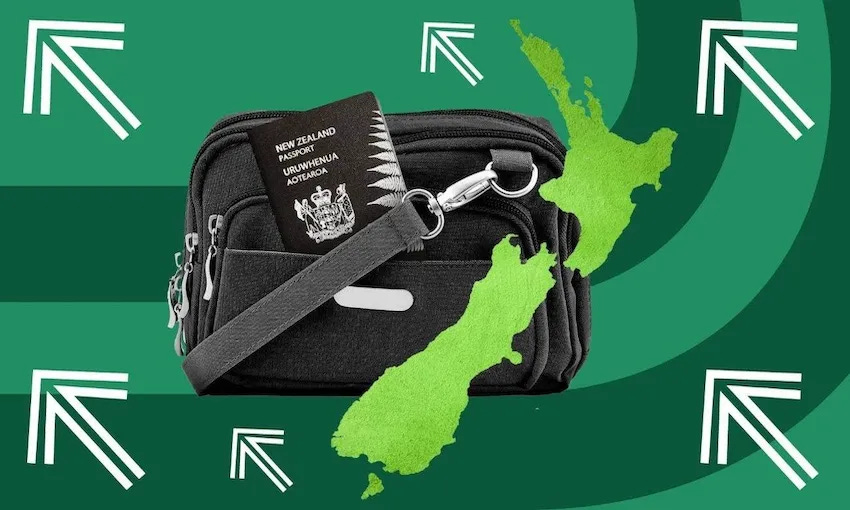How the All Blacks can turn their losses into wins
A brand and marketing expert advises handling their current crisis by opening up, being humble, honest and even shedding a tear or two...
Kia ora and welcome to Stocktake, created in partnership with Kiwibank. The music industry has returned in full force lately, with international artists visiting and venues pumping again. I’ve enjoyed great shows by Tyler, the Creator and Wet Leg, and will soon take my daughter to her first big gig when Billie Eilish performs at Spark Arena. For a healthy, thriving music industry we need venues of all shapes and sizes. In recent years, we’ve lost the Kings Arms and the Logan Campbell Centre, while Dunedin’s Crown Hotel is also under threat. Also hanging by a thread is the mothballed St James, which was vandalised and damaged extensively, causing flooding and fungus issues. Auckland loves that venue. It’s a crucial part of Queen Street returning to its former glory, and a vital missing link for our live industry. Please add your voice to this petition if you feel the same. This week: The All Blacks.
-Chris Schulz, business editor
‘Come clean … be vulnerable … let your guard down’
The All Blacks, says Bodo Lang, have become boring. Over the past decade, New Zealand’s national team has won so much, so often and so convincingly that their performances have lost all meaning. “We’ve become blind to the fact that they’re always winning,” says Lang, a University of Auckland brand and marketing expert. “We just expect them to win. If somebody’s number one all of the time, that actually becomes boring.”
Lately, though, that’s changed. After late season losses to France and Ireland last year, a recent series loss against Ireland, and a major demolition job by South Africa, the All Blacks’ invincible tag has been shaken. Five losses from their last seven games is not something the team or fans are used to, and it shows. The response has been a mess, with cancelled press conferences, rumours of a showdown looming with coach Ian Foster, a lack of communication with fans and mixed media messages leading to headlines like this absolutely bonkers prediction of Foster’s imminent demise.
All of that is a sign of a team in disarray. From the outside looking in, it’s been tough for fans to watch. Sunday morning’s 35-23 win against the Springboks helped calm the storm, but there are tests against Argentina and Australia looming, as well as a UK tour including matches against Wales, Scotland and England. It’s unlikely the All Blacks will win all of those. “It's quite an unreasonable expectation for a team … to always win,” says Lang. “Sport is unpredictable. At some point, everybody stumbles.” That means turmoil could easily strike again.
So how can the All Blacks turn their on-field losses into off-field wins? I asked Lang, who’s worked with some of the world’s biggest brands, to answer that question because it’s something many businesses have to deal with. Any brand, company or CEO embroiled in a PR crisis (I’m looking at you, Simon Henry) has a lesson to learn. In Aotearoa, none comes bigger than the All Blacks. Lang agrees their series of losses is damaging and could lead to a commercial crisis. “They're becoming less attractive for sponsors in the future, because everyone wants to back a winner.”
Is it possible to turn that around? Yes, Lang says it is. It could even be good for them. “Having a series of losses could potentially add to the All Blacks [brand],” he says. To do this, they’d need to accept losing as part of their story by embracing their arc. Lang makes it sound like a movie plot. “Here's a team that's topped the world rankings for a long time. Here's a period where they weren't at the top. This is how they've dug their way out of it and they've come back to the front.” Lang believes this would shift the narrative and add “integrity and complexity” to their brand.
That, clearly, is not how the All Blacks do things. Winning is all they’ve ever done, so they haven’t had to embrace losing for a very long time. Lately, chaos has been their de facto response to a series of bad performances. Lang says a co-ordinated, honest and humble response to their poor results could go a long way. “Just say, ‘Mate, we’re not up to it right at the moment, we’ll be back shortly,’” he says. “Use some of those New Zealand values – hard work, calling a spade a spade – to indicate a bit of vulnerability. Acknowledge it, embrace it, and bounce back from it.”
That’s all well and good, but the All Blacks are supposed to be the toughest of the tough. This is a team with a legacy of giants like Colin Meads, men who farmed and played rugby and then farmed again, players like Wayne Shelford who thought nothing of staying on the field with missing teeth and a testicle ripped open, or Richie McCaw, who performed at the 2011 Rugby World Cup with a gruesome foot injury. They’re players who pounded their opposition into submission while leaving everything they’ve got out on the field.
Surely admitting to weaknesses goes against all that? Lang believes if there’s ever a moment to do it, it’s now. “Times have moved on from the heroes you just described,” he says after I mention players like Meads and Shelford. He points to John Kirwan revealing his mental health issues as proof. “We expect them to be tough, we expect them to be brutal at times, we expect them to be unrelenting on the field. Off the field, it's permissible, possibly even desirable, to come clean and let their guard down.”
Lang cautions against sending the entire team to group therapy and filming the results. This doesn’t need to be a Metallica moment. He believes the power of just a couple of players getting emotional, maybe even shedding a tear or two, would go a long way. “You just need a couple of big players to front up and say, ‘This wasn't right, we're not quite sure what's wrong with us.’ It needs to be authentic, a sense of, ‘It's not just the fans that are suffering – the players are suffering too.’ What’s it like when a world-beating team is suddenly getting beaten? What does that feel that like?”
It’s a big call. But five losses in seven games are unprecedented times, and that requires an unprecedented response. Lang believes it would work. It could help flip the script, stop the relentless demands for Foster to go, re-energise and re-engage supporters’ passion for the team. After all, even the best of us have off days. After the past couple of years, that’s an easy message to relate to.
We’ve all been through some stuff. “I think people would respond to this,” says Lang. “They'd go, ‘Actually, maybe we have been unrealistic with our expectations and maybe let's not tear them down, let's back them up.’ It could turn the conversation around … I think it could resonate.” There are lessons there for the All Blacks, and anyone else needing to front foot tough times too.
Stay ahead of the curve with Kiwibank Business
Kiwibank’s team of economists can help you make smarter decisions for your business. With their expert insights and forecasts your business is in safe hands with Kiwibank. To get tailored business advice you can trust, try Kiwibank’s Business Banking. Find out more here.
The story I’m watching closely…
It was a shocking statistic. But were one million New Zealanders really considering leaving New Zealand once our borders re-opened? For Stuff, Keith Lynch followed the story that was reported by news outlets around the country, and used by the National Party as a reason the Labour government was failing. It’s a fascinating deep dive into how statistics and data can be spun to be read one way, when really they’re saying something else. Crunch the numbers for yourself here.
The headlines you need to know about…
Twenty-four men living in a six-bedroom house, driving your own bus, working in freezing cold weather, all to earn $370 a fortnight. If you’re thinking about chucking in your day job for seasonal work, you may want to read Madeleine Chapman’s eye-opening piece first.
Property prices are dropping, and they’re forecast to keep heading down for a good while yet. But does that mean they’re truly affordable? Alex Casey takes a tour of “starter” properties in Auckland and finds many are still miles out of reach for first home buyers.
Noticed your restaurant bills getting a little higher lately? Going out a little less because of it? You’re not the only one. I was fascinated by this (paywalled) New York Times story that pieces together exactly why things are so expensive right now, with everything from wine imports being delayed to increasing steel prices for oven parts. No wonder a cocktail costs $20 these days.
Foldable phones are not going away. In fact, judging by Samsung’s latest line-up of flip phones and foldable tablets they’re more popular than ever. Your move, Apple.
Simon Gault spent three years developing a tomato sauce that was sweetened by vegetables instead of sugar, a product he estimates costs him hundreds of thousands of dollars. He’s just pulled it from shelves and my kids are bereft. Find out why here.
Gen Z is making and consuming media in ways that can be difficult for older generations to understand. On this week’s episode of The Fold, Duncan Greive and Lucy Blakiston team up to interview Rex Woodbury, the author of the Digital Native newsletter. They ask him why we're in the early stages of multiple major shifts and what it means for media and society. Listen here.
After two years of pandemic life, workplaces need to adapt to entice and keep staff. “Organisations need to allow people to bring their whole selves to work, have some focus on equity and Te Tiriti, create spaces where their people can connect, and actually ask their people what they want,” says Massey University wellbeing manager Zoe Brownlie. Find out if your office measures up here.
If climate change projections make their way to Land Information Memorandums, owners of coastal properties may find themselves struggling to stay afloat long before waves start lapping at their door. Vulnerable properties will become uninsurable causing banks to withhold lending. Passing on that slice of hot potato paradise will be near impossible. In the latest episode of When the Facts Change, James Shaw joins Bernard Hickey to talk about the real meaning of climate change adaptation and who's responsible for funding infrastructure that will mitigate the effects. Listen here.
Finally, here’s something I’ve been toying with…
When Industry came out in 2020, I couldn’t understand a word of it. The complicated financial jargon used by staff on a foreign exchange desk in the fictional UK bank of Pierpoint went so far over my head it felt like I needed a degree just to understand it. Soon, I realised it didn’t matter. Like Succession, Industry is a show about money and power (and a lot of sex and drugs). You can still understand it even if you don’t get it, thanks to its brutal depiction of a life spent living in that world. Every character is selling part of themselves to be there. As Industry’s excellent second season debuts on Neon (seriously, episode two is some of the greatest television I’ve seen this year) the question it keeps asking is, how much exactly are you willing to sell to be part of it? Some? Most? All? (Industry, streaming via Neon) /Chris Schulz
If you love The Spinoff, our newsletters are a great way to stay connected to what we’re about. We publish a range of great newsletters including our daily news digest, The Bulletin, food (The Boil Up) and the environment (Future Proof) as well as our wraps of our best work The Spinoff Daily and The Weekend.
If you liked what you read today, share Stocktake with friends, family and colleagues.












